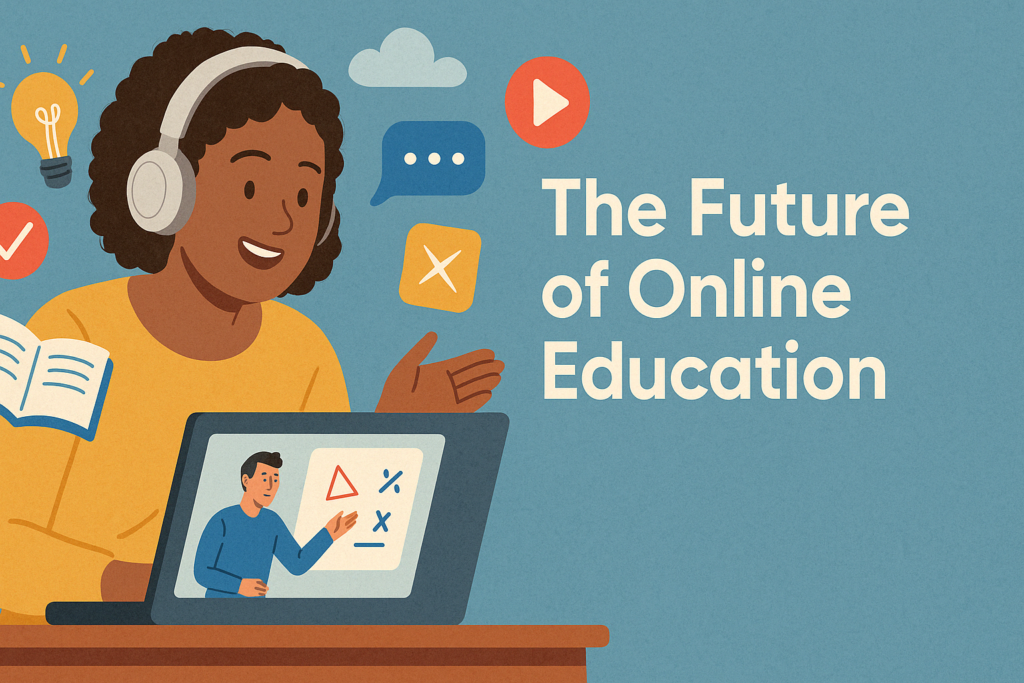Let’s just say it: online education used to feel like a digital version of watching paint dry — except the paint was trying to teach you trigonometry. But those days? They’re (mostly) gone. These days, the future of online education isn’t just about Zoom calls and PDF downloads. It’s morphing into something weirdly exciting. Think less “virtual chalkboard” and more “choose-your-own-adventure, but with Wi-Fi.”
So what’s really brewing in the world of digital learning? Buckle up, we’re about to crack this open like a cold can of “ed-tech with personality.”
No More Snoozefests: The Rise of Virtual Classrooms That Don’t Suck
Let’s address the awkward elephant in the virtual room: virtual classrooms used to be a hot mess. Laggy video. Monotone lectures. Everyone talking while on mute — except that one person who never was.
But the next wave of virtual classrooms is finally catching up to, well, the actual internet. We’re talking AI-powered tutors that actually help instead of spitting out robotic nonsense. Live polls. Gamified content. Real-time breakout sessions where group projects don’t feel like punishment.
Some platforms even use eye-tracking tech to tell if you’re zoning out (which sounds mildly invasive but also, maybe helpful?). Because if your teacher can’t see your glazed-over expression, your browser can.
Digital Courses With More Plot Twists Than Netflix
Goodbye bland PowerPoints. Hello interactive modules that make your brain go, “Wait—this is actually kinda fun?”
The best digital courses now look more like games, documentaries, or YouTube rabbit holes — and less like a digitized textbook. Think microlearning episodes you can binge-watch between lunch and doomscrolling. Or course creators dropping pop culture references mid-lesson to keep things spicy. (Yes, a business strategy class just compared Elon Musk’s Twitter era to the Game of Thrones finale. Iconic.)
And with platforms like MasterClass and Skillshare calling in celebs and pros who’ve actually done the thing, learners are getting real-world advice instead of theories from 1997.
E-Learning Meets Real Life — Finally
Once upon a time (OK, like five years ago), e-learning felt detached from the actual world. It was like trying to learn to swim from a YouTube video while standing in your living room.
Now? E-learning’s got street smarts. Courses are shorter, more specific, and hyper-customized. Want to learn Excel shortcuts for startup founders with ADHD? There’s a niche course for that. Prefer learning coding through meme-based flashcards? Also a thing. Honestly, it’s never been easier to learn your way.
Plus, remote certifications are gaining legit street cred with employers — especially when the person hiring you also learned to build spreadsheets from a guy named Mike on Udemy.
The Future Is (Almost) Here: VR Headsets and AI Tutors
Let’s talk about the flashy stuff.
Some schools are already handing out VR goggles like they’re 3D glasses at the movies. Students can now dissect a frog, walk through the Colosseum, or practice public speaking in front of a pretend (but very judgy) virtual audience — all without leaving their bedroom.
Meanwhile, AI tutors are moving past awkward chatbot territory. They’re learning how to personalize lessons based on your attention span, learning style, and how many times you reread the same sentence without absorbing a single word (we’ve all been there).
And with 5G making it all faster than your cat when it hears the treat jar, things are only speeding up. 5G isn’t just an upgrade — it’s like strapping a rocket to your Wi-Fi and whispering, “Go off, king.”
So, What’s the Catch?
Well, it’s not all rainbows and Retina displays. There’s still a digital divide, and not everyone has the tech or bandwidth to ride this wave. Plus, the temptation to watch one “quick” episode during class is real. (Spoiler: it’s never just one.)
Also, not every online course is a gem. For every thoughtful, beautifully-designed digital course, there’s one that feels like it was built in a rush by someone who thinks “learning objectives” are optional.
Final Thoughts (Because We’re Human and Need Closure)
Online education is growing up. It’s no longer the awkward cousin of traditional learning — it’s more like the cool sibling who travels the world, works remotely, and still remembers your birthday.
Will it replace schools? Probably not. But will it keep evolving into something more human, more flexible, and way less boring? Absolutely.
And hey, if you can earn a certificate in AI prompt engineering while lying in bed with a face mask on and a smoothie nearby… that’s the kind of future we can get behind.


